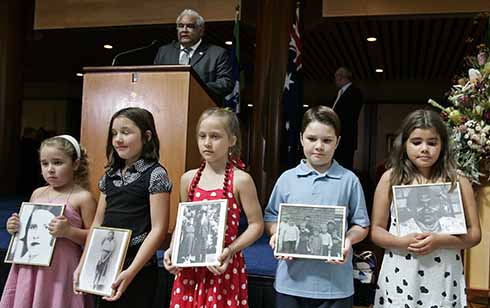 The Apology of then Prime Minister Kevin Rudd to the Stolen Generations on 13 February 2008 is a landmark in Australian history.
The Apology of then Prime Minister Kevin Rudd to the Stolen Generations on 13 February 2008 is a landmark in Australian history.
Once inconceivable, it is now set in stone forever. It is also a measuring stick by which to judge the present treatment of Indigenous Australians as well as Parliamentary conduct today.
Expressions of respect
Apologies are significant because they are expressions of respect. They also acknowledge a moral code shared by both parties, and a common acceptance that it has unjustifiably been disregarded. They also imply a pledge to act differently in the future. The respect embodied in the apology is based in the common humanity shared by both parties, which lies deeper than differences based on religion, race and wealth.
In the Apology the Australian Government spoke on behalf of all Australians in recognising that it acted wrongly in removing Indigenous children from their parents. The removal was dictated by the disrespectful claim that its targets were defined, not by their shared humanity, but by their race. This disrespect caused lasting damage to the children and families.
Acknowledgment of equality
It was of great significance that the Prime Minister made the Apology in person to representatives of the Stolen Generations. In doing so he emphasised that all Australians are equally entitled to respect, and that the Government and all Australians are responsible to ensure treat all Australians are treated equally, regardless of race and history.
The Apology made strong statements about the way we Australians commit ourselves to treat one another. They can never be unsaid. They can, however, be disregarded. For that reason, the Apology continues to be important. It is a measuring stick by which both Parliamentary behaviour and the treatment of Indigenous Australians can be judged.
The dignity, seriousness and non-partisan spirit of the Apology stands in judgment on the rancorous disregard of Parliamentary conventions, lack of seriousness and courtesy displayed and so widely criticised in subsequent years. It also, of course, contrasted with much Parliamentary conduct in preceding years.
Set a standard
The Apology has also set a standard by which we can measure the treatment of Indigenous Australians today. In particular it highlights the disrespect underlying the election-driven Intervention that preceded the Apology and the subsequent humiliating and disempowering measures directed against Indigenous communities. Though not driven directly by racially biased ideology, too, the disproportionate rate at which Indigenous children are removed from their mothers, Indigenous children are incarcerated and decisions are made without proper consultation about Indigenous communities, indicate a serious institutional lack of respect.
Finally, the Apology is something to build on. In the Australian community it has become increasingly common to acknowledge the Traditional Owners of the Land.
Indigenous Australians called on to speak at these events no longer come as guests but as hosts. A significant number of Indigenous Australians are entering the professions and the arts, and lead programs in various community organisations.
A hope for better things
These things do not make up for the Institutional disrespect suffered by Indigenous Australians. They do offer hope, however, that the spirit of the Apology may engender respect in the relationship between settler and Indigenous Australians.
Image: Tom Calma from Reconcilliation Australia addresses the audience in Members Hall as a group of "Stolen Generations" descendants hold images of their relatives after Prime Minister Kevin Rudd delivered an apology to Aboriginal people at the Australian Parliament on February 13, 2008 in Canberra, Australia. (Photo by Andrew Sheargold/Getty Images)